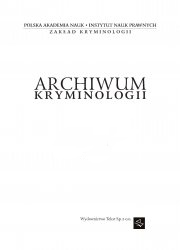Wsparcie procesu readaptacji społecznej skazanych na przykładzie programu „Teatr, Mama, Tata i Ja”
Supporting the social re-adaptation of prisoners on the basis of the programme “Theatre, Mummy, Daddy, and Me”
Author(s): Anna Dąbrowska, Justyna Kusztal, Małgorzata TurczykSubject(s): Criminal Law
Published by: Instytut Nauk Prawnych PAN
Keywords: corrective programmes;social rehabilitation;convicted;prisoners;the right of the child to contact the parent;Convention on the Rights of the Child;children of incarcerated parents;
Summary/Abstract: The article presents an innovative programme for the re-adaptation of inmates confined in correctional facilities which focusses on building and consolidating their bonds with their children. In Poland, contemporary social rehabilitation programmes are based on measures listed in the Polish Executive Penal Code of 1998 (Executive Penal Code, 1997, Art. 67 § 3). Apart from studying, working, cultural and educational activities, and therapeutic interventions, the Code also mentions contact with family members and relatives. These rehabilitation programmes include the right of convicts, under international and national law, to maintain contact with their families, while methodologically they are compliant with the most current cognitive-behavioural approach to therapy and corrective measures. They also draw on the multi-systemic approach, in a general sense. In the context of safeguarding children’s rights, contact between parents and children is the responsibility of the parents, but in the case of prisoners it is the responsibility of the correctional institution to ensure that prisoners can exercise their rights while serving a custodial sentence. The article takes advantage of the methodologies of document analysis and participant observation. It discusses the programme for the social re-adaptation of prisoners, which involves encouraging and consolidating relationships between parents and children while maintaining a focus on particular rehabilitation objectives, resocialisation methods, and outcome evaluation. Celem artykułu jest prezentacja innowacyjnego programu readaptacji skazanych w zakładzie karnym nakierowanego na budowanie i wzmacnianie więzi z dziećmi. Program „Teatr, Mama, Tata i Ja” realizowany jest od 2015 r. do chwili obecnej przez zespół Teatru Lalki i Aktora „Kubuś” i pracowników Aresztu Śledczego w Kielcach dla osób odbywających karę pozbawienia wolności. Współczesne programy resocjalizacji wykorzystują podstawowe środki resocjalizacji wymienione w polskim Kodeksie karnym wykonawczym z 1998 r. Obok nauki, pracy, zajęć kulturalno-oświatowych i sportowych oraz oddziaływań terapeutycznych regulacje prawne wskazują na kontakty z rodziną i osobami bliskimi. Programy te uwzględniają prawo skazanych do utrzymywania kontaktów z rodziną na mocy prawa międzynarodowego i krajowego, a w zakresie metodycznym są adekwatne do najbardziej aktualnego podejścia kognitywno-behawioralnego w terapii (cognitive-behavioural therapy) i działaniach korekcyjnych. Realizacja kontaktów dzieci z rodzicami jest obowiązkiem rodziców w kontekście zabezpieczenia praw dziecka, a po stronie instytucji korekcyjnej leży obowiązek zapewnienia skazanym realizacji ich praw w czasie odbywania kary pozbawienia wolności. Artykuł ma charakter empiryczny, wykorzystuje bowiem metody analizy dokumentów oraz obserwacji uczestniczącej.
Journal: Archiwum Kryminologii
- Issue Year: 2/2019
- Issue No: XLI
- Page Range: 335-363
- Page Count: 29
- Language: Polish

